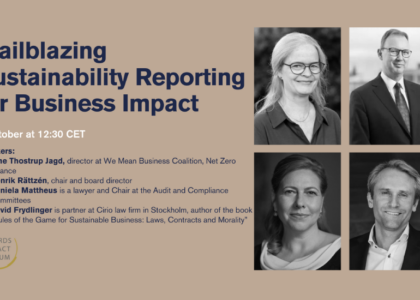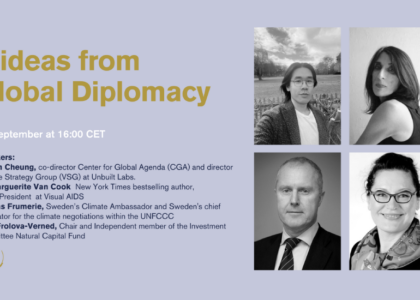Table of Contents
Navigating the Complexity of Corporate Stewardship: A Journey of Boards Towards Sustainability

Imagine this: you’re sitting in a boardroom, surrounded by the sharpest minds in your industry. The air is thick with conversation about profits, risks, and opportunities. The agenda is packed, as usual, with discussions that demand immediate attention—short-term pressures that always seem to take precedence.
But somewhere in the back of your mind, a quieter voice whispers about the long-term impact of these decisions. Sustainability, you think, but can you really afford to dwell on that right now?
This is the paradox many board members find themselves trapped in, as outlined in the EZ Board Stewardship Report (September 2024). While everyone in that boardroom knows sustainability is not just a buzzword but an imperative, only about 25% of directors feel truly equipped to address it. Sustainability, for many, remains an elusive, overwhelming challenge—a topic that’s often sidelined for more pressing matters. Yet, the clock is ticking, and the stakes couldn’t be higher.
Deep Dive Discussion
Listen to an 8-minute Deep Dive Discussion about the topic
Deep Dive Board Sustainability Stewardship
The Complexity Conundrum: Boards Stuck in a Traditional World

Take Tony Fish, a Board Trustee and author interviewed in the report. He frames the challenge perfectly: board members are good at dealing with the “Known” and “Unknown.” These are the risks they can quantify, the opportunities they can somewhat predict. But it’s the “Unimagined” and the “Things We Don’t Want to Know” that make directors anxious. How do you plan for the challenges you can’t yet see? How do you make space for the kind of thinking that embraces the unpredictability of today’s business landscape?
Colin Mayer, Emeritus Professor at Oxford’s Saïd Business School, argues that we don’t need a revolution to address this issue, but we do need a significant shift in the way businesses approach value creation. He believes that profit should stem from solving problems rather than creating them. The idea is simple: companies should make money in ways that benefit everyone, rather than leaving others to clean up their mess.
This is where the concept of stewardship comes in—a more profound, purposeful leadership mindset. It’s not about knowing all the answers but about embracing the interconnectedness of people, planet, and profit. This holistic approach requires boards to shift from traditional governance to one that recognizes their business as part of a larger, ever-changing system.
Generations Agree: We Want Purpose, Not Just Profit
Interestingly, the report dispels the myth of generational conflict in the workplace. A global study in partnership with Kearney found that employees—whether they’re Baby Boomers, Millennials, or Gen Z—all want the same things: purposeful work, ethical leadership, and sustainable practices. Here lies an opportunity for boards. The future of leadership lies in building a unified, cross-generational approach that prioritizes sustainability. The question is, will boards rise to this challenge, or will they remain trapped in old ways of thinking?
Breaking Free: The Role of Diversity in Stewardship
Rebecca Robins, a board trustee and author, talks about the importance of next-generation boards—ones that blend the wisdom of experience with the fresh perspectives of younger directors. It’s not just about adding diversity for the sake of optics; it’s about bringing in new voices that challenge traditional viewpoints and ask different questions. The report stresses that whether it’s gender, ethnicity, neurodiversity, or generational diversity, having directors who think differently is crucial to navigating the complexities of sustainability.
But it doesn’t stop there. The key isn’t just diversity; it’s inclusion. Are these new voices being heard? Are their ideas being embraced, or are they stifled by the weight of tradition? One board member reflected, “I seem to be the lone voice on the boards I serve, trying to push sustainability forward.” How many others are echoing the same sentiment? This isolation, the report notes, is a major barrier to progress.
A Shift from Accountability to Creativity

For decades, boards have seen their role as one of accountability—ensuring compliance, managing risk, driving profit. But what if that’s not enough anymore? What if the greatest role a board can play now is one of creativity? Sander Tideman, an executive coach featured in the report, challenges boards to redefine their identity: not as gatekeepers of compliance but as creators of value for society. He believes boards have the potential to move from overseeing risks to driving innovation, from being accountability-focused to becoming catalysts for creative solutions.
In today’s complex world, there are no easy answers, and that’s okay. Boards, the report argues, aren’t expected to have all the solutions. They’re expected to ask the right questions—to foster an environment where curiosity thrives and innovation blossoms. This shift will require directors to let go of the notion that they must know it all. Instead, they must lean into the unknown, the unimagined, and the uncomfortable.
Focusing on the Bigger Picture

Yves Doz, co-author of “Escaping the Growth Curse: The Path to Stronger Corporate Strategy”, addresses another critical challenge facing boards: the tendency to focus on short-term operations at the expense of long-term strategy. He argues that day-to-day pressures often overshadow strategic discussions that could unlock significant benefits for the organization. According to Doz, boards must resist this temptation and prioritize both financial performance and sustainability. Only by doing so can they guide companies toward a more sustainable future.
Doz’s perspective adds another layer to the idea of stewardship: it’s not just about survival in the short term but about steering the ship towards long-term resilience. The ability to see beyond immediate pressures and refocus on the broader, strategic horizon is key to fostering innovation and navigating the complexities of today’s business environment.
Finding the Courage to Lead Differently
The challenge for board members, especially those nearing the later stages of their careers, is reconnecting with what brought them to leadership in the first place. It’s easy to get bogged down by daily demands and short-term goals. But the report reminds us that directors must reflect on their deeper purpose. Why did they join the board? What kind of legacy do they want to leave behind?
Jennifer Garvey Berger, CEO of Cultivating Leadership, explains that true stewardship is about thinking generations ahead, seeing beyond the immediate to understand the long-term impact of today’s decisions. It’s about balancing the reality that “I really matter” with “It’s not all about me.” This kind of thinking requires directors to be both patient and impatient—patient with the slow progress of sustainability but impatient with the pace of change within their own boardrooms.
The Journey Ahead: Embracing the Stewardship Mindset

The road to stewardship isn’t easy. It requires courage, vulnerability, and a willingness to question the status quo. But as the report emphasizes, the reward is profound. When boards adopt a stewardship mindset, they equip themselves with the tools to balance short-term pressures with long-term sustainability. They become not just protectors of profit but stewards of the future—leaders who understand that the challenges we face today, if tackled creatively and collaboratively, will shape a more resilient, sustainable world for generations to come.
The journey starts now. It’s time for boards to rise above the noise of short-termism, embrace complexity, and lead with purpose. Because, as the report so beautifully puts it, “People don’t want to follow a machine. They want to follow someone who sees, who feels, who quests, who dreams—and who loves.”
The future is asking more from today’s boards. The question is: Will they answer the call?
Learn more:
Webinars
Join our upcoming webinars:
Sep 25 8-9.30 AM CET Risk of AI and Cybersecurity for Boards with NED Ana Cernat and Ned and CEO Securitas Digital Martin Althén
Sep 26 4-5.30 PM CET Five ideas from Global Diplomacy for Board Members with Researcher & NEDs Marvin Cheung, Dr Margueriete Van Cook, NED Irina frolova.Verned, Swedens Climate Ambassador Matthias Frumerie
Oct 4 12.20-2PM CET Trailbalzing Sustainability Reporting, with Business Impact with Dr Jane Thostrup Jagd, We Mean Business, NEDs Daniela Mattheus and Henrik Rättzen, Advisor & Author David Frydlinger
About the report:
The EZ Board Stewardship Report (September 2024) examines the crucial role of board stewardship in navigating the complex and ever-changing business landscape. It highlights the challenges boards face in adopting a stewardship mindset, which encompasses a broader understanding of sustainability, stakeholder engagement, and systems thinking. The report acknowledges that traditional board agendas and governance structures often hinder progress on sustainability and that a shift in mindset is necessary for directors to effectively address long-term risks and opportunities. It proposes strategies for individuals and boards to embrace complexity, evolve their dynamics, and elevate their ambition for a more responsible and sustainable future.
EZ Board Stewardship Board Reflection Guide: Navigating Complexity for a Sustainable Future
Answer the following questions in 2-3 sentences.
- What paradox is highlighted regarding board members’ views on sustainability?
- According to the report, what percentage of board members feel equipped to handle the challenges of sustainability?
- How does Egon Zehnder define “complexity” in the context of board stewardship?
- What does the report identify as the biggest obstacle to the adoption of board stewardship?
- According to Tony Fish, which areas present the biggest challenge for boards in their decision-making?
- What surprising consensus did Egon Zehnder’s global study on generational expectations reveal?
- How does the report suggest that boards can futureproof their businesses?
- What is the significance of “next-generation boards” as discussed in the report?
- Beyond diversity, what crucial aspect of board composition does the report emphasize?
- What key question should directors ask themselves to facilitate self-transformation and embrace stewardship?
Reflection Guide Example Answers
- While board members recognize the importance of sustainability, many feel ill-equipped to act on it due to a lack of knowledge and support.
- Only about 25% of directors surveyed felt they had adequate knowledge of sustainability risks and opportunities.
- Complexity is defined as the combination of multiple interconnected parts that are difficult to separate or understand in isolation, often involving a high degree of uncertainty.
- The report identifies the biggest obstacle to board stewardship as the mindset and culture of boards, often rooted in traditional approaches to governance.
- Tony Fish highlights “the Things We Don’t Want to Know” and “the Unimagined” as the most challenging areas for boards, as they can cause anxiety and fear.
- The study found that employees across all generations largely desire the same things: purposeful work, ethical leadership, and sustainable practices, aligning with the principles of stewardship.
- The report suggests that boards can futureproof their businesses by engaging in horizon scanning to identify and address potential risks and opportunities related to societal, regulatory, and commercial demands.
- Next-generation boards are crucial for fostering inclusivity, nurturing future leaders, and creating systemic change by bringing in diverse perspectives and ensuring that different generations learn from each other.
- The report stresses the importance of inclusion – ensuring that diverse voices are not only present but also genuinely heard and valued in boardroom discussions.
- Directors should ask themselves, “How easy or hard is it for you to let go of your narrative? Of your current truth?” to facilitate self-transformation and embrace new perspectives.
Glossary of Key Terms
Board Stewardship Purposeful and responsible leadership that focuses on creating long-term value for a business through interconnected, inclusive, and resilient behaviours. It emphasizes a systems-wide view, collaboration, and purpose-driven performance.
Complexity A state characterized by multiple interconnected parts and a high degree of uncertainty, making it difficult to predict, control, or fully understand.
Horizon Scanning The process of identifying and analyzing potential future trends, risks, and opportunities that could impact an organization.
Next-Generation Boards Boards that prioritize age diversity and inclusion, particularly by incorporating younger generations, to foster a more dynamic and forward-thinking approach to governance.
Psychological Safety An environment where individuals feel comfortable speaking up, sharing their ideas, and taking risks without fear of negative consequences.
Resilience The ability of an organization to adapt and thrive in the face of challenges, disruptions, and uncertainty.
Servant-Leader A leadership style that prioritizes serving others, empowering individuals, and fostering a collaborative and supportive environment.
Stakeholders Individuals or groups who have an interest in or are affected by an organization’s activities, including employees, customers, investors, suppliers, and the wider community.
Sustainability Meeting the needs of the present generation without compromising the ability of future generations to meet their own needs. In a business context, it encompasses environmental, social, and governance (ESG) factors.
Systems Thinking An approach to problem-solving that considers the interconnectedness of elements within a system and seeks to understand the bigger picture rather than focusing on isolated parts.
About Boards Impact Forum and the blogpost
This blogpost is authored by Chair Boards Impact Forum, Board Member at Climate Governance Initative, Chair and Ned at Listed and Private Companies Liselotte Engstam, supported with AI-enhanced insights. Illustrations by Unsplash+
Events arranged by Boards Impact Forum in collaboration with World Economic Forum (Non Profit Board Network, partnering with Board Networks , INSEAD Corporate Governance Centre, Digoshen and Next Agents )
This blogpost is also shared at the blog of of Digoshen, www.digoshen.com.








Recent Comments